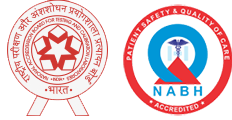
AJANTA HEART CENTER
Ajanta Heart Center
Today we are facing an alarming situation all around the world when it comes to Heart matters. Heart diseases are rapidly increasing in India day by day. According to W.H.O. (World Health Organization) the statistics of Heart disease in India are as under
Coronary Heart Disease :
The prevalence of Coronary Heart Disease is 3% in rural and 7% in urban; roughly 50 million are estimated to have this disease. Heart Attack and stroke account for 30% of total death due to diseases.
Hypertension :
About 5-10% population suffers from this disease (lower figure for rural and higher figure for urban area). As age advances the risk of Hypertension also advances, reaching to a level up to 30%. In India about 50 million people suffer from Hypertension.
WHO Estimates for Number of Diabetics in India
The estimates based on various epidemiological studies according to ICMR, WHO suggests that there were 32 million diabetics in INDIA in 2004 and it is projected that India would have largest number of diabetics (80 million) in the world by 2030. As we all know that if someone is under the grip of diabetes he or she have to have take good care of their heart because in the long run diabetes effect your heart and ultimately leads to a serious heart disease.
Some common types of cardiovascular disease are high blood pressure, coronary heart disease, stroke, rheumatic heart disease, congenital cardiovascular defects and congestive heart failure. The Ajanta Heart Center at Ajanta Hospital & IVF Centre has a variety of technologies and services aimed at treating cardiovascular disease in emergencies and elective care situations. Our patients are cared for in a thorough and professional manner using advanced technologies including:
- Cardiac Catheterization Lab — Radiological equipment and dyes are injected into arteries to diagnose and treat heart disease. Interventional tools such as balloons and stents are fed through a catheter into the coronary arteries to reduce stenosis, the narrowing of blood vessels, and increase blood flow.
- Echocardiography — Uses ultrasound waves to produce accurate images of the heart in action, allowing cardiologists to evaluate the heart's performance, its chambers and valves.
- Electroencephalogram (EEG) — Monitors the brain's electrical activity to help diagnose strokes, seizures and other conditions.
- Electrocardiogram (EKG) — Traces electro-activity in the heart to help diagnose cardiac problems.
- Pacemaker Analysis — Tests the functioning capacity of implanted pacemakers.
- Treadmill Exercise Stress Testing — Measures the heart's performance while under the stress of physical activity.
- Ultrasound with Doppler — Tracks changes in a patient's cardiac output and fluid volume, which are critical indicators of how well the heart is transporting blood and oxygen to the organs.
The Department of Cardiology at Gleneagles Global Hospitals offers treatment for the following cardiac diseases.
- Acute coronary syndrome
- Angina Pectoris
- Aortic valve disease
- Arrhythmia
- Bacterial Endocarditis
- Bradycardia
- Cardiomyopathy
- Coronary Artery Disease
- Heart Arrhythmia
- Heart Disease
- Heart Murmurs
- Heart Palpitations
- Heart valve disease
- Hypertrophic cardiomyopathy
- Left Ventricular Hypertrophy
- Long QT syndrome
- Myocarditis
- Pericardial effusion
- Rapid heartbeat
- Wolff Parkinson White Syndrome

